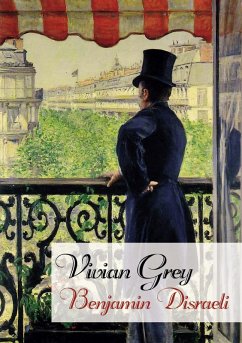
Vivian Grey by Benjamin Disraeli, Fiction
Versandkostenfrei!
Versandfertig in 1-2 Wochen
25,99 €
inkl. MwSt.

PAYBACK Punkte
13 °P sammeln!
Disraeli's early "silver fork" novels Vivian Grey (1826) and The Young Duke (1831) featured romanticised depictions of aristocratic life (despite his ignorance of it) with character sketches of well-known public figures lightly disguised. In some of his early fiction Disraeli also portrayed himself and what he felt to be his Byronic dual nature: the poet and the man of action. Disraeli was barely twenty-one when he published "Vivian Grey," his first work of fiction; and the young author was at once hailed as a master of his art by an almost unanimous press. In this, as in his subsequent books,...
Disraeli's early "silver fork" novels Vivian Grey (1826) and The Young Duke (1831) featured romanticised depictions of aristocratic life (despite his ignorance of it) with character sketches of well-known public figures lightly disguised. In some of his early fiction Disraeli also portrayed himself and what he felt to be his Byronic dual nature: the poet and the man of action. Disraeli was barely twenty-one when he published "Vivian Grey," his first work of fiction; and the young author was at once hailed as a master of his art by an almost unanimous press. In this, as in his subsequent books, it was not so much Disraeli's notable skill as a novelist but rather his portrayal of the social and political life of the day that made him one of the most popular writers of his generation, and earned for him a lasting fame as a man of letters. In "Vivian Grey" is narrated the career of an ambitious young man of rank and in this story the brilliant author has preserved to us the exact tone of the English drawing room, as he so well knew it, sketching with sure and rapid strokes a whole portrait gallery of notables, disguised in name may be, but living characters nevertheless, who charm us with their graceful manners and general air of being people of consequence. "Vivian Grey," then, though not a great novel is beyond question a marvelously true picture of the life and character of an interesting period of English history and made notable because of Disraeli's fine imagination and vivid descriptive powers.














